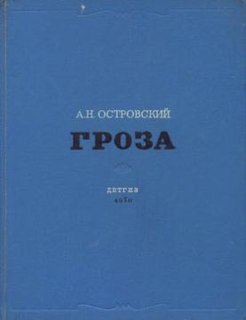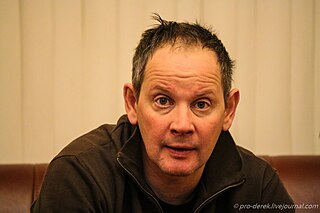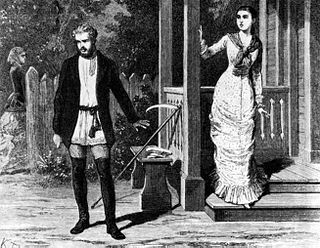
The Storm is a drama in five acts by the 19th-century Russian playwright Aleksandr Ostrovsky. As with Ostrovsky's other plays, The Storm is a work of social criticism, which is directed particularly towards the Russian merchant class.

Without a Dowry is a play by Alexander Ostrovsky that premiered on 22 November [O.S. 10 November] 1878 at the Maly Theater and first published in the January 1879 issue of Otechestvennye Zapiski. Met with indifference by the contemporary critics, later it came to be regarded as a classic of the Russian theatre. Yakov Protazanov directed a cinematic adaptation, Without Dowry, which was released in 1937, and Eldar Ryazanov also adapted it into a popular 1984 film.
The Poor Bride is a play by Alexander Ostrovsky, written in 1851 and first published in the No.4, 1852 issue of Moskvityanin magazine. It was his first play to be staged at the Maly Theatre, where it premiered on 20 August 1853.
It's a Family Affair-We'll Settle It Ourselves is a comedy by Alexander Ostrovsky. It was his first major work, written in 1849 and published in the No.6 1850 Moskvityanin issue. Having caused a furore, it was banned by the Imperial Theatres' censorship committee and was staged for the first time on 9 December 1860, ten years after its publication. For some time the play has been also referred to as The Bankrupt, which was its original title.
Stay in Your Own Sled is a play by Alexander Ostrovsky, written in 1852 and first published in the No.5, 1853, issue of Moskvityanin. It was premiered in the Maly Theatre on January 14, 1853.
Poverty is No Vice is a play by Alexander Ostrovsky, written in 1853 and published as a separate edition in the early 1854. It was premiered in Moscow's Maly Theatre on January 25, 1854 and in Saint Petersburg's Alexandrinsky Theatre on September the 9th.
A Profitable Position is a play by Alexander Ostrovsky. It was first published in No.1, January 1857 issue of Russkaya Beseda and came out as a separate edition later that year. Banned from being produced at the Russian Imperial theatres, it was premiered only six years later, on September 27, 1863, in Saint Petersburg's Alexandrinsky Theatre as a benefice for actress Elizaveta Levkeyeva. On October 14 of the same year it was performed in Maly Theatre, as actress Ekaterina Vasilieva's benefice.

Lyubov Pavlovna Nikulina-Kositskaya was a Russian Empire theatre actress, best known for her work in the Maly Theater, notably in Alexander Ostrovsky's plays.
Live Not as You Would Like To is a play by Alexander Ostrovsky. It premiered on 3 December 1854 at the Moscow's Maly Theatre and was published for the first time in the No. 17, September 1855 issue of Moskvityanin magazine.
A Protégée of the Mistress is a play by Alexander Ostrovsky, first published in the No.1, January 1859 issue of Biblioteka Dlya Chteniya. Refused the permission to be produced at the Imperial Theatres in October 1859, it premiered in Maly Theatre, Moscow, only on October 21, 1863.
Sin and Sorrow Are Common to All is a four-act drama by Alexander Ostrovsky, written in 1852 and published on the No. 1, 1863 issue of Vremya magazine, edited by the Dostoyevsky brothers. It premiered in the Maly Theatre in Moscow, on 21 January 1863, as a benefit for director Alexander Bogdanov. Later that year, Ostrovsky was awarded the Uvarov Prize for it.
An Ardent Heart is a play by Alexander Ostrovsky written in 1858 and first published in the January 1869 issue of Otechestvennye Zapiski. It was premiered on 15 January 1869, at the Moscow's Maly Theatre and then on 29 January at the Saint Petersburg's Alexandrinsky Theatre.
It's Not All Shrovetide for the Cat is a play by Alexander Ostrovsky written in 1871 and first published in the No. 9, September 1871 issue of Otechestvennye Zapiski. It was premiered on October 7, 1871, in Moscow's Maly Theatre.

The Forest is a play by Alexander Ostrovsky written in 1870 and first published in the January 1871 issue of Otechestvennye Zapiski magazine. It was premiered at Saint Petersburg's Alexandrinsky Theatre on 1 November 1871, as a benefit for actor Fyodor Burdin. In Moscow's Maly Theatre it was performed on November 26, 1871.
The Snow Maiden is a play by Alexander Ostrovsky written in 1873 and first published in the September 1873 issue of Vestnik Evropy.

Daniil Ivanovich Spivakovsky is a Russia's film and theater actor, Honored Artist of Russia (2007). Head of the workshop of Theatre faculty of the Moscow Institute of Television and Radio Broadcasting Ostankino.

Light Without Heat is a five-act play by Alexander Ostrovsky, based upon the play The Broken Happiness by his friend, a fellow dramatist Nikolai Solovyov, which Ostrovsky re-worked. It premiered at the Moscow Maly Theatre on 6 November 1880 and first appeared in print in 1881, in Ogonyok magazines, as the Ostrovsky and Solovyov's joint work.

Polina (Pelageya) Antipyevna Strepetova was a Russian stage actress, renowned for her tragic parts, who provided a deep and expressive portrayal of "a suffering, protesting Russian woman."















